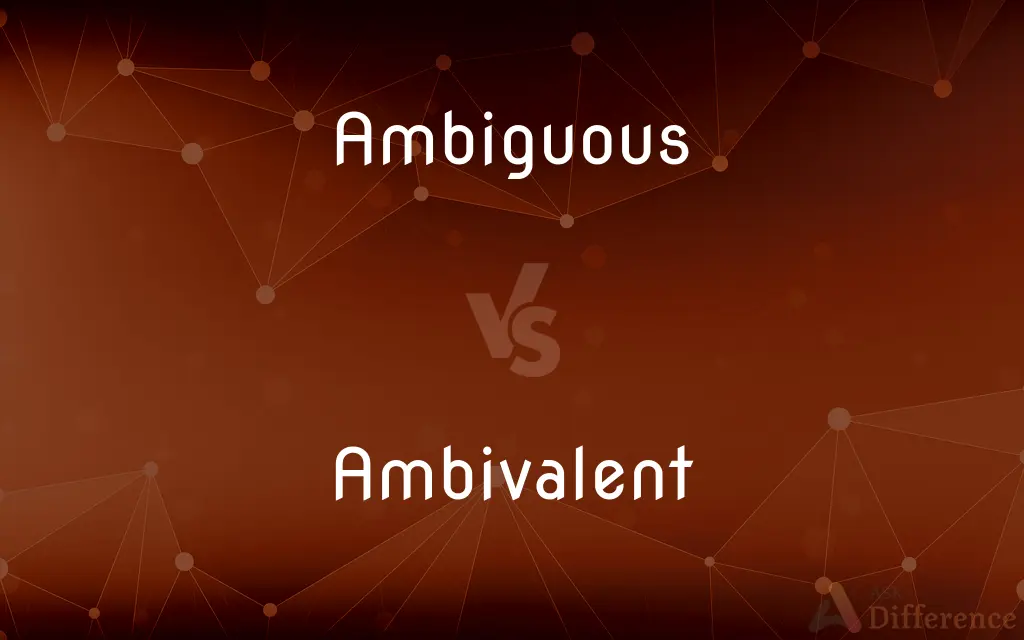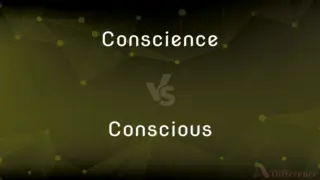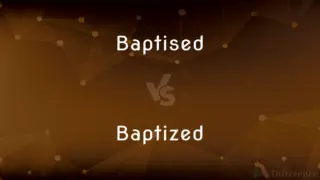Ambiguous vs. Ambivalent — What's the Difference?
Edited by Tayyaba Rehman — By Fiza Rafique — Updated on November 2, 2023
"Ambiguous" means open to more than one interpretation. "Ambivalent" (assuming "ambivalen" is a typo) refers to having mixed feelings about something.

Difference Between Ambiguous and Ambivalent
Table of Contents
ADVERTISEMENT
Key Differences
Ambiguous content often leaves the audience guessing, open to multiple interpretations. Ambivalent feelings can leave a person torn between two opposing views on the same subject.
Each ambiguous phrase lacks clearness or definiteness, leading to uncertainty. Ambivalence, however, specifically deals with a person's feelings or attitudes towards something, indicating simultaneous conflicting reactions.
Ambiguous situations may not be intentional, possibly due to lack of information. In contrast, ambivalence is a psychological state where an individual genuinely experiences two emotions about something at the same time.
An ambiguous message might puzzle the receiver, who may ask for clarification. Someone ambivalent might express uncertainty about a decision, not due to lack of understanding but due to mixed emotions.
With ambiguous terms, context can sometimes provide clarity. Ambivalence, on the other hand, is an internal experience and may not be resolved by external clarification.
ADVERTISEMENT
Comparison Chart
Meaning
Open to more than one interpretation
Having mixed or contradictory feelings
Usage
Describing unclear language or situations
Describing conflicting emotional states
Context
Can be due to vague language or lack of detail
Relates to internal conflict and indecision
Nature
Generally unintentional or due to imprecision
Reflects a person's emotional complexity
Resolution
Often resolved with additional information
Resolved by making a personal decision
Compare with Definitions
Ambiguous
"The instructions were ambiguous and confusing."
Ambivalent
"He felt ambivalent about the promotion."
Ambiguous
"The ending of the story was ambiguous."
Ambivalent
"His ambivalence about the issue was frustrating."
Ambiguous
"His ambiguous statement made me question his intent."
Ambivalent
"Her ambivalence towards the move was cleaa."
Ambiguous
"The ambiguous nature of the poem leaves room for interpretation."
Ambivalent
"She was ambivalent about her feelings for him."
Ambiguous
"She gave an ambiguous answer that could mean either yes or no."
Ambivalent
"Ambivalent emotions overcame her during the farewell."
Ambiguous
Open to more than one interpretation
An ambiguous reply.
Ambivalent
Having mixed feelings or contradictory ideas about something or someone
An ambivalent attitude to Europe
Some loved her, some hated her, few were ambivalent about her
Ambiguous
Doubtful or uncertain
"The theatrical status of her frequently derided but constantly revived plays remained ambiguous" (Frank Rich).
Ambivalent
Exhibiting or feeling ambivalence.
Ambiguous
Open to multiple interpretations.
The politician was criticized for his ambiguous statements and lack of precision.
Ambivalent
Simultaneously experiencing or expressing opposing or contradictory feelings, beliefs, or motivations.
Ambiguous
Hesitant; uncertain; not taking sides.
Ambivalent
Alternately having one opinion or feeling, and then the opposite.
His feelings toward his parents are ambivalent.
Ambiguous
Doubtful or uncertain, particularly in respect to signification; capable of being understood in either of two or more possible senses; equivocal; as, an ambiguous course; an ambiguous expression.
What have been thy answers? What but dark,Ambiguous, and with double sense deluding?
Ambivalent
Undecided as to whether or not to take a proposed course of action; having feelings both for and against the proposed action.
Ambiguous
Open to two or more interpretations; or of uncertain nature or significance; or (often) intended to mislead;
An equivocal statement
The polling had a complex and equivocal (or ambiguous) message for potential female candidates
The officer's equivocal behavior increased the victim's uneasiness
Popularity is an equivocal crown
An equivocal response to an embarrassing question
Ambivalent
Characterized by a mixture of opposite feelings or attitudes;
She felt ambivalent about his proposal
An ambivalent position on rent control
Ambiguous
Having more than one possible meaning;
Ambiguous words
Frustrated by ambiguous instructions, the parents were unable to assemble the toy
Ambivalent
Uncertain or unable to decide about what course to follow;
Was ambivalent about having children
Ambiguous
Having no intrinsic or objective meaning; not organized in conventional patterns;
An ambiguous situation with no frame of reference
Ambiguous inkblots
Common Curiosities
Does ambivalence imply indecision?
Often, as it involves mixed emotions that can hinder decision-making.
What does "ambiguous" mean?
"Ambiguous" means not clear and open to more than one interpretation.
Can one be ambivalent about something positive?
Yes, one can have mixed feelings even about positive situations.
Is ambiguity subjective?
It can be, as different people might interpret the same ambiguous information differently.
Is ambivalence a sign of a psychological problem?
Not always, it can be a normal response to complex situations.
Can a situation be both ambiguous and ambivalent?
A situation can be ambiguous, but a person is ambivalent.
What does "ambivalent" mean?
"Ambivalent" means having mixed feelings or contradictory attitudes about something.
Is ambiguity always intentional?
Not necessarily, it can occur unintentionally due to lack of clarity.
How can ambiguity be reduced in communication?
By providing clear, precise, and detailed information.
Can ambivalence be beneficial?
It can be, as it reflects the consideration of different perspectives.
Does ambivalence affect relationships?
It can, as it might cause uncertainty and tension in decisions.
Can ambiguity be clarified?
Yes, often through additional information or context.
Is there a measure for ambiguity?
Ambiguity is qualitative and context-dependent, so not easily measured.
Can ambiguity be a literary device?
Yes, it is often used purposely in literature to add depth.
How does one resolve ambivalence?
Through introspection, discussion, and sometimes counseling.
Share Your Discovery

Previous Comparison
Conscience vs. Conscious
Next Comparison
Baptised vs. BaptizedAuthor Spotlight
Written by
Fiza RafiqueFiza Rafique is a skilled content writer at AskDifference.com, where she meticulously refines and enhances written pieces. Drawing from her vast editorial expertise, Fiza ensures clarity, accuracy, and precision in every article. Passionate about language, she continually seeks to elevate the quality of content for readers worldwide.
Edited by
Tayyaba RehmanTayyaba Rehman is a distinguished writer, currently serving as a primary contributor to askdifference.com. As a researcher in semantics and etymology, Tayyaba's passion for the complexity of languages and their distinctions has found a perfect home on the platform. Tayyaba delves into the intricacies of language, distinguishing between commonly confused words and phrases, thereby providing clarity for readers worldwide.















































